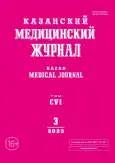Vaccination Adherence Among Parents of Preschool-Aged Children
- Authors: Gerasimova N.A.1, Khasanova G.R.2, Saperkin N.V.3, Mamchits L.P.4, Magomedalieva S.G.5
-
Affiliations:
- Kazan State Medical University
- Office of Rospotrebnadzor for the Nizhny Novgorod region
- Privolzhsky Research Medical University
- Gomel State Medical University
- Dagestan State Medical University
- Issue: Vol 106, No 3 (2025)
- Pages: 465-473
- Section: Social hygiene and healthcare management
- URL: https://journal-vniispk.ru/kazanmedj/article/view/311415
- DOI: https://doi.org/10.17816/KMJ656082
- EDN: https://elibrary.ru/RKVKRK
- ID: 311415
Cite item
Abstract
BACKGROUND: Nonadherence to vaccination in the general population poses a major obstacle to achieving epidemiological well-being.
AIM: To assess vaccination adherence among parents of preschool-aged children in selected cities in Russia and Belarus.
MATERIAL AND METHODS: A cross-sectional descriptive study was conducted using an anonymous online survey administered to parents whose children attended preschool institutions in Almetyevsk, Kazan, Makhachkala, Nizhny Novgorod, and Rybnoye in Russia and Gomel in Belarus. The questionnaire included 16 items with single or multiple response options. Overall, 801 participants were surveyed. Statistical analysis was performed using R 4.3.1 (RStudio). Proportions with 95% confidence intervals and standard errors (P ± p) were calculated. The independent-sample t-test was used for normally distributed variables and the Mann–Whitney U test and Kruskal–Wallis test for asymmetrically distributed variables.
RESULTS: A positive attitude toward vaccination was reported by 76.2 ± 11.7% of respondents (range across cities: 56%–91%). The main motivations for vaccinating children were protection against serious infections (68.8% ± 7.3%), concern about access to educational institutions (16.2% ± 9.6%), and recommendations from healthcare providers (9.1% ± 5.8%). Negative attitudes were identified in some parents, including fear of adverse reactions (13.5%), concerns about vaccine safety (8.3%), and the belief that children should only be vaccinated against the most dangerous diseases (9.1%). Furthermore, 47.6% of the respondents expressed interest in receiving additional information about vaccination. The preferred sources of information were consultations with pediatricians (78.3%), printed educational materials (28.3%), dedicated websites (23.2%), lectures on clinic websites (17.2%), and hotline consultations (15%). Only 11.9% of the respondents favored information obtained through social media.
CONCLUSION: Some parents of preschool-aged children in Russia and Belarus demonstrate negative attitudes toward vaccination. Parents show a strong willingness to receive information from healthcare professionals.
Full Text
##article.viewOnOriginalSite##About the authors
Nadezhda A. Gerasimova
Kazan State Medical University
Email: nivanova-00@mail.ru
ORCID iD: 0000-0002-4932-0000
Leading specialist-expert, Depart. of Supervision of Hygiene of Children and Adolescents
Russian Federation, 49 Butlerova st, Kazan, 420012Gulshat R. Khasanova
Office of Rospotrebnadzor for the Nizhny Novgorod region
Author for correspondence.
Email: gulshat.hasanova@kazangmu.ru
ORCID iD: 0000-0002-1733-2576
SPIN-code: 6704-2840
Scopus Author ID: 6507469219
ResearcherId: AAH-6849-2019
MD, Dr. Sci. (Medicine), Professor, Head of Depart., Depart of Epidemiology and Evidence-based-medicine
Russian Federation, Nizhny NovgorodNikolay V. Saperkin
Privolzhsky Research Medical University
Email: saperkin_nv@pimunn.net
ORCID iD: 0000-0002-3629-4712
SPIN-code: 3318-6323
MD, Cand. Sci. (Medicine), Assistant Professor, Depart. of Epidemiology and Evidence-Based Medicine
Russian Federation, Nizhny NovgorodLyudmila P. Mamchits
Gomel State Medical University
Email: epidem@gsmu.by
ORCID iD: 0000-0003-3660-030X
SPIN-code: 1649-2051
MD, Cand. Sci. (Medicine), Assistant Professor, Depart. of Epidemiology and Evidence-Based Medicine
Belarus, GomelSabiyat G. Magomedalieva
Dagestan State Medical University
Email: magomedalieva.s@yandex.ru
ORCID iD: 0000-0002-1369-8001
SPIN-code: 7145-1292
Assistant Lecturer, Depart. of Epidemiology
Russian Federation, MakhachkalaReferences
- Dimala CA, Kadia BM, Nji MAM, Bechem NN. Factors associated with measles resurgence in the United States in the post-elimination era. Sci Rep. 2021;11(1):51. doi: 10.1038/s41598-020-80214-3 EDN: XTABAR
- Filia A, Bella A, Del Manso M, et al. Ongoing outbreak with well over 4,0003measles cases in Italy from January to end August 2017 — what is making elimination so difficult? Euro Surveill. 2017;22(37):pii=30614. doi: 10.2807/1560-7917.ES.2017.22.37.30614
- Briko NI, Mindlina AYa, Galina NP, et al. Adherence to immunoprevention: how to change the situation? Fundamental and clinical medicine. 2019;4(4):8–18. doi: 10.23946/2500-0764-2019-4-4-8-18 EDN: TVPLLH
- Plakida AV, Briko NI, Namazova-Baranova LS, et al. Increasing population adherence to vaccination: evaluation and a systematic approach to implementation. Epidemiology and Vaccinal Prevention. 2022;21(3):4–26. doi: 10.31631/2073-3046-2022-21-3-4-26 EDN: FAJXOX
- Ta'an WF, Al-rashdan RA, Shatnawi RM, et al. Determinants of maternal adherence to child vaccination in jordan: A cross-sectional study. Sci Rep. 2024;14(1):24635. doi: 10.1038/s41598-024-74183-0 EDN: KNJEAB
- Shishova AV, Zhdanova LA, Rusova TV, Ivanova IV. Vaccination adherence: views of parents and health professionals at children’s polyclinics (example of the ivanovo region). Public Health and Life Environment — PH&LE. 2023;31(11):42–49. doi: 10.35627/2219-5238/2023-31-11-42-49 EDN: BXGVSY
- Fedorova IV, Sergienko EN, Vysockaja VS, Rybak NA. Clinical and epidemiological features of pertussis in the Republic of Belarus and modern strategy of vaccination (part 1). Pediatrics. Eastern Europe. 2022;10(3):311–318. doi: 10.34883/PI.2022.10.3.002 EDN: HUQIIT
- Burlutskaya AV, Savelyeva NV, Tereshina YuA, Serkina AA. Vaccination of children: opinions and awareness of parents. International research journal. 2021;7(109):57–61. doi: 10.23670/IRJ.2021.109.7.044 EDN: ZHTTNW
- Timoshkova SD, Fedoseenko MV, Rusinova DS, et al. Assessment of vaccination adherence among outpatient clinicians. Pediatric pharmacology. 2024;21(1):15–23. doi: 10.15690/pf.v21i1.2719 EDN: ERSJWF
- Chernova TM, Timchenko VN, Myskina NA, et al. Causes of violation of the vaccination schedule for young children. Pediatrician. 2019;10(3):31–36. doi: 10.17816/PED10331-36 EDN: FACWBW
- Girina AA, Petrovsky FI, Zaplatnikov AL. Adherence of pediatricians to immunoprophylaxis of infectious diseases: current state of the problem. Russian journal of woman and child health. 2020;3(4):290–294. doi: 10.32364/2618-8430-2020-3-4-290-294 EDN: CGNLPS
Supplementary files









